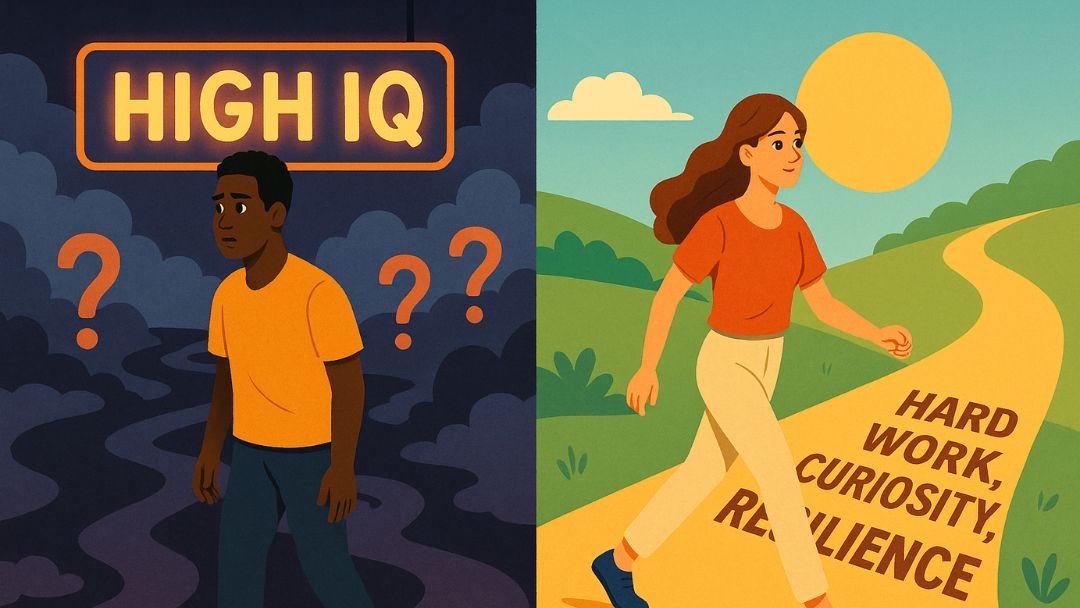Surprising Myths and Realities about Intelligence Quotient: How Important Is IQ to Success?
While it’s easy to assume that people with higher IQ scores have what it takes to become successful, the truth is that there’s more that goes into success than just your intelligence. Discover the truth about IQ and success, distinguishing facts from fiction as we reveal how important the Intelligence Quotient is to success and other underlying factors that come into play.


Back
14 mins read
More often than not, people view IQ as a significant factor in someone’s success, especially when high achievers proudly reference their scores. Many prominent figures, like Donald Trump, frequently mention IQ as a marker of accomplishment, while others, such as Elon Musk and former President Richard Nixon, have publicly valued intelligence as a key driver of success.
However, not everyone agrees that IQ is essential for achieving success. Steve Jobs famously downplayed the importance of IQ, favoring qualities like creativity and resilience over standardized measures of intelligence. Similarly, Mark Zuckerberg has highlighted that passion, adaptability, and quick learning are more essential to success than a high IQ score.
While some public figures equate a high IQ with inevitable success, the reality is far more complex — the notion that IQ guarantees achievement is not as straightforward as it may seem. In fact, research suggests that a higher IQ alone rarely predicts career, financial, or academic success.
Simply put, IQ is a measure of your reasoning capabilities — and can be a strong statistical predictor of life success as far as objective indicators are concerned. IQ tests, on the other hand, gauge and categorize individuals at certain scores depending on how well they do in particular situations. Most online IQ tests measure or identify people with a higher IQ score than the average intelligence.
The debate around ‘how IQ scores predict success’ will take center stage as we delve into the complex relationship between intelligence and life outcomes. We'll also explore the nuances of IQ’s role and examine the multitude of factors that collectively sculpt the path to success.
All this sets the stage for a comprehensive understanding of what drives achievement.
Suspect you have a higher IQ? Take this IQ Test now and find out!
Key Takeaways
- While IQ plays a role in academic and professional achievements, it is not the sole determinant of success; other important factors include hard work, mental toughness, perseverance, emotional intelligence, personality type, and opportunities.
- Job performance success involves more than just cognitive abilities, incorporating factors such as experience, interpersonal skills, motivation, and networking, alongside the need for ethical considerations in IQ tests.
- Personal traits like resilience, passion, empathy, and social skills often predict success more reliably than IQ scores. They highlight the importance of emotional and social intelligence in personal and professional realms.
- There is a distinct difference between being intelligent (as measured by a number) and being smart.
Related: 7 Icons Who Changed the World Despite Their Modest IQs
High IQ and Success: Are They Connected?
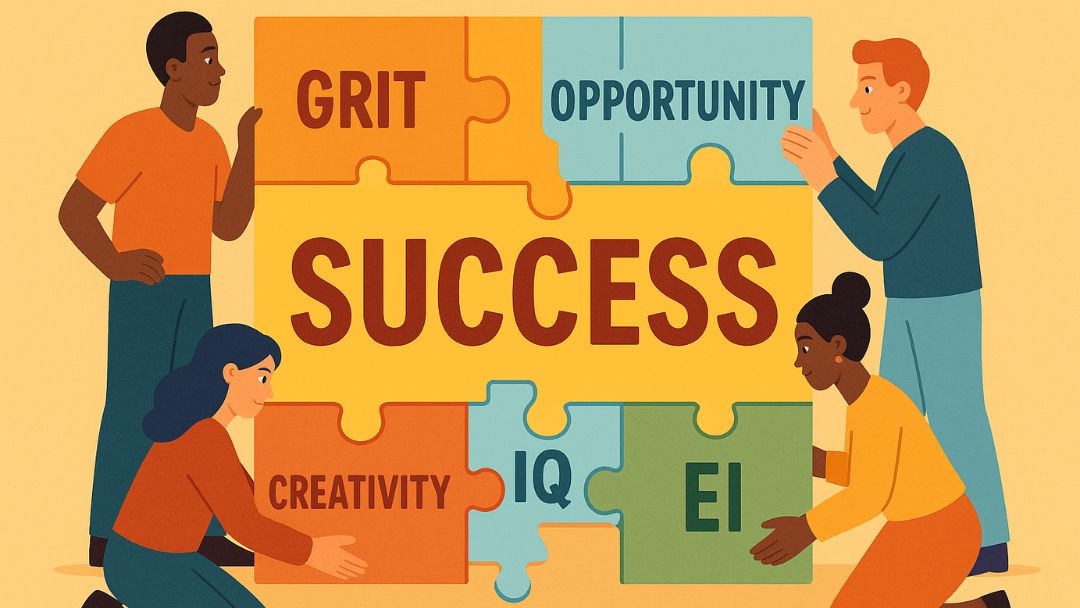
When we consider intelligence, IQ — or Intelligence Quotient — success is often the first thing that comes to mind.
Many studies have associated high IQ scores with academic success and a thriving career, presenting a straightforward path guided by cognitive capabilities. But is it really as simple as this? Can a high IQ score guarantee achievement in life, or are average IQ scores just as capable of achieving success?
The idea linking intelligence and socioeconomic success is inherently complex.
While cognitive abilities assessed through IQ tests play an important role in excelling academically or professionally, they’re not solely responsible. Several other factors contribute to success, such as hard work, determination, better mental health, and accessibility when discussing more scientific results. Similarly, having a high IQ score doesn't guarantee you won't display acts of stupidity.
Moreover, having only a single measure may be inadequate when predicting someone’s achievements. It is often scrutinized so widely about errors because these sets wholly overlook creative aptitude and instead use emotions! Certainly, the correlation between IQ and success is significant in terms of understanding. However, you can't understand the comprehensive narrative of success without accounting for those additional components surrounding it.
Is a High IQ Score a Guarantee of Academic Achievement?
What impact does IQ have on academic achievement? Originally intended to identify students in need of extra educational assistance — IQ tests were formulated to measure cognitive capabilities and potential. They gauge various aspects of intelligence that can reasonably predict success in academics up to a certain extent.
Think of IQ testing score as an abstract number that correlates with other abstract numbers, like future annual income. It just shows you how complex the conversation of intelligence really is, let alone how you measure it. Many IQ tests you've probably heard of may have some ounce of validity.
Research has shown that IQ score correlates with school performance at a moderate level (around 0.5), indicating a significant but not sole influence. Therefore, relying solely on IQ test scores comes with its disadvantages. The purpose of many IQ tests was to forecast scholastic aptitude as well as the likelihood of learning disorders. They fail to encompass all aspects of the game. Many people with a “genius level IQ” have failed to live up to their expected potential.
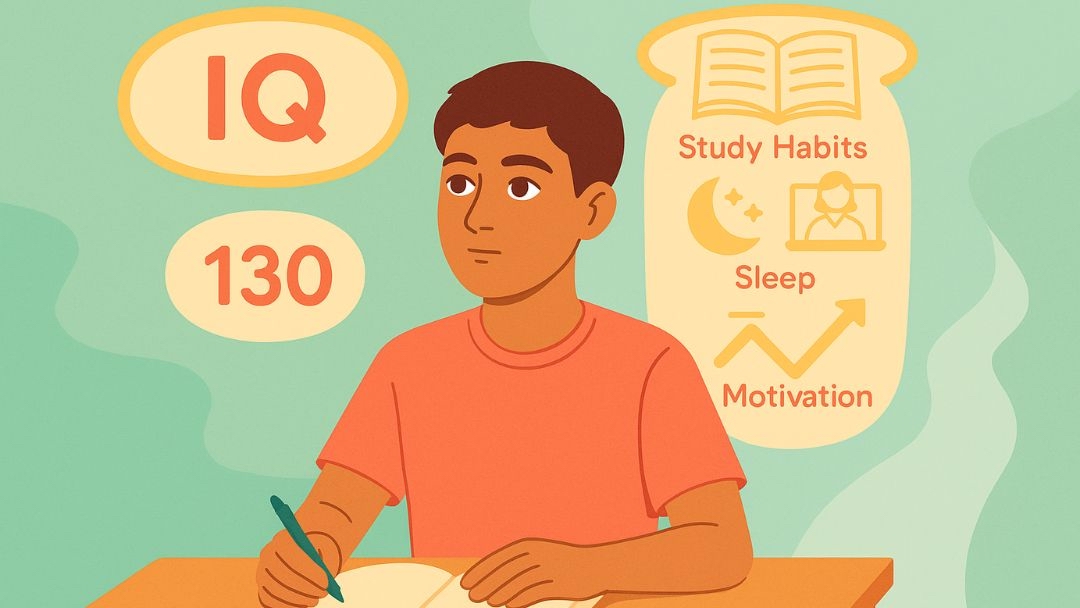
IQ Scores and Career Advancements
Moving away from academic spheres, the correlation between IQ scores and career success is worth exploring. While IQ can serve as an indicator of work productivity and achievement, its reliability as a predictor remains uncertain. The workplace environment comprises multiple tangible and intangible elements that influence job performance.
They include experience, skills, personality traits and interests, motivation levels, social abilities, networking, and growth opportunities. You can't deny that higher IQ scores may contribute to professional advancement. However, it does not solely determine it. Moreover, intelligence tests raise ethical concerns due to historical connections with discrimination, making them potentially biased toward certain cultures.
Critics argue that they act more like gatekeepers rather than gauge true intellectual potential. To address these issues, equitable assessment methods like job performance evaluations and interviews have been proposed instead of relying solely on traditional IQ tests provided by major test publishing companies. Apart from IQ tests, factors such as self-confidence, stress management mechanisms, and drive influence worker efficiency also come into play.
Even though IQ tests reflect partial insights into capabilities, the weightage given exclusively should not outweigh other determinants. Many psychological characteristics come hand-in-glove with conveying victory. Generally speaking, knowing your IQ provides a glimpse of potential success in life outcomes, but you can't solely rely on it.
Beyond Cognitive Ability: Other Factors at Play
While cognitive ability is crucial to predicting success, it's not the only factor at play. Qualities such as self-regulation, growth mindset, conscientiousness, openness to experience, and social skills also contribute significantly to determining multiple future life outcomes. In fact, beyond IQ testing and cognitive abilities lie other crucial elements that can be more reliable indicators of socioeconomic success.
Emotional intelligence and personal traits are strong predictors of multiple life outcomes. It is, therefore, important to evaluate an individual’s potential for success through a comprehensive assessment that considers their personality traits, emotional intelligence, and social skills alongside traditional measures like IQ scores.
Experts suggest personality traits hold greater influence than cognitive abilities in shaping one's path toward future success. They emphasize the need for considering all aspects while assessing someone's likelihood of attaining desired financial success. Life is complex with numerous contributing factors; thus, it would benefit individuals to adopt holistic evaluations rather than solely relying on IQ scores when trying to determine probable successes.
Defining Success: Personal and Professional Perspectives

As we delve deeper into the nuances of achievement, it becomes apparent that success itself is a multi-dimensional concept. The definition of success has evolved, moving beyond mere academic excellence or landing a lucrative job. Today, it places more emphasis on fostering a positive mindset, gaining recognition in one’s profession, and building strong support systems.
Success has traditionally been measured in professional environments using job performance indicators such as KPIs and metrics, growth rate, market share, and ROI. Personal accomplishment considers various factors, including education level, skill set diversity, parental socioeconomic status, and other factors.
This two-fold perspective serves as a reminder that there isn’t a universal formula for achieving triumph. It is highly individualized, varying from person to person. While general mental ability can contribute significantly towards both personal fulfillment and career progression, they only form parts of a larger complex puzzle.
Professional Success: More Than Just an IQ Test
Achieving professional success goes beyond having a high IQ. It involves a combination of various qualities, including technical skills, social abilities, organizational behavior, critical thinking, and the ability to handle challenges. This is a fact. Other traits are necessary for excelling in one’s job, accomplishing career goals, and making an impact within their field.
Possessing desirable personality traits is crucial for attaining professional success. These include strong work ethics that foster attributes such as responsibility, dedication towards quality workmanship, and discipline while encouraging collaboration with others at the workplace.
Having determination along with commitment can contribute immensely toward realizing outstanding achievements. It leads to increased productivity levels, enhancing superior job performance outcomes on assigned tasks. Therefore, cultivating individual growth is required across different areas of specialization associated with any profession or role played by individuals.
Personal Fulfillment: A Different Measure of Success
On the other hand, personal fulfillment offers an alternate measure of success. This subjective idea is influenced by various factors such as relationships, individual growth, and hobbies.
Personal fulfillment strongly impacts one’s perception of success because it emphasizes achieving important life goals that contribute to overall satisfaction in personal life. Individual development plays a crucial role in attaining personal fulfillment and success, leading to self-awareness and a sense of purpose and worth.
It also helps individuals to invest in relationships and self-improvement. Far from that, social connections can foster feelings of contentment and happiness, as they provide support systems for personal advancement.
The Influence of Personality on Success
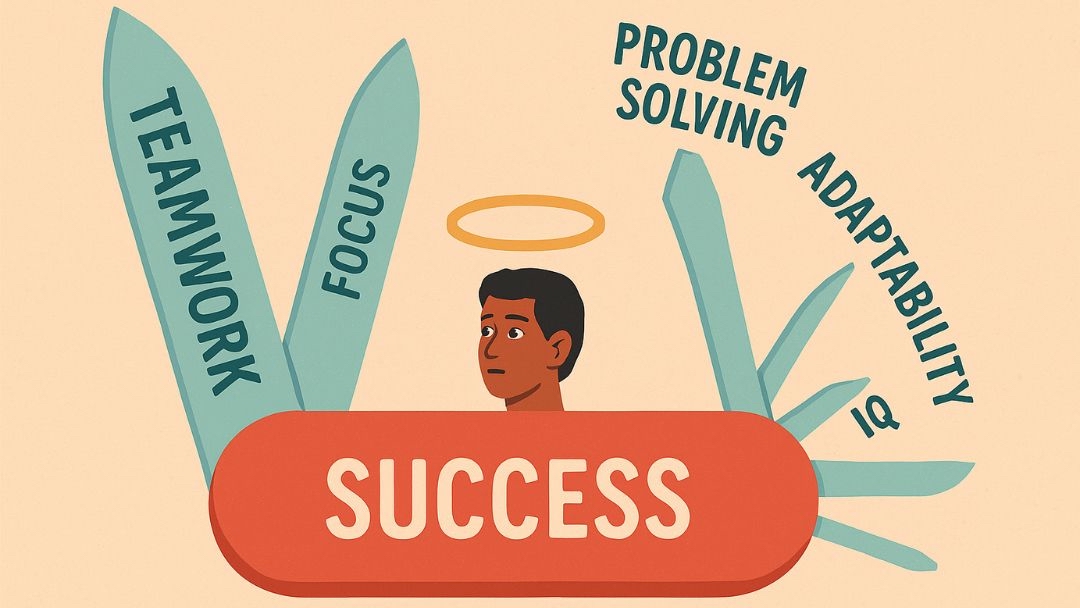
Personality plays a crucial role in shaping our identity, preferences, and behaviors. It also greatly influences how we interact with the world. It is not surprising that personality has a significant impact on achieving success in life.
According to Sutton Trust Analysis, there are three key findings regarding personality and career success:
- Extroverted individuals have 25% higher chances of landing high-paying jobs compared to those who are less outgoing.
- People with greater levels of conscientiousness experience more successful careers.
- Those with higher emotional stability tend to achieve better results in their chosen profession.
The Holland RIASEC Model was developed by psychologist John Holland and categorizes individuals into six different personality types. It's based on their interests and their connection to career choices. This model suggests that people prefer working environments where they can collaborate effectively with others who share similar characteristics.
By recognizing one’s inclinations toward certain fields or tasks through this model, individuals may discover potential conflicting interests leading them towards distinct job roles. Pursuing a career path that does not align well with one’s natural disposition can present several challenges. They include reduced productivity levels or even burnout from work-related stressors resulting in overall dissatisfaction at work.
Taking up side projects aligned closely with individual passions might help restore motivation for some. Others may find satisfaction despite being confined within unsuitable jobs driven solely by financial needs. Through these means, some find fulfillment, which translates into successfully navigating one's professional endeavors, ultimately contributing productively both socially and financially.
Take the Holland career test and find out which careers match your personality.
Personality Types and Career Alignment
Aligning personality types with careers can significantly impact job satisfaction and success. Enabling individuals to excel in their tasks, resulting in improved performance. Additionally, it can lead to higher job satisfaction as individuals find meaning and fulfillment in their work.
Personality assessments like the Holland RIASEC Model and the Myers-Briggs Type Indicator (MBTI) can be extremely helpful in identifying one’s personality type. It can align it with potential career paths. However, the accuracy of these self-assessments in determining career paths is contingent upon the individual's self-awareness level.
Therefore, while aligning personality types with careers can lead to increased job satisfaction and success, it’s not a guarantee. It’s crucial to consider other factors and circumstances and make adjustments to ensure a satisfying and fulfilling career.
Not sure of your personality type? Take the MBTI personality test here.
When Personality Clashes with Profession
When an individual’s personality is not aligned with their profession, it can result in various problems. This may include confusion about one's self-identity, restricted use of strengths, higher levels of stress, and dissatisfaction. Moreover, it leads to potential disturbances in the workplace dynamic, disengagement from work responsibilities, and lower overall job performance and satisfaction.
Do such frustrations turn into opportunities for growth? Yes, they allow colleagues to engage in open discussions to understand each other's perspectives—addressing the issue directly but privately with those involved. It opens up discussions where individuals try to understand where other colleagues are coming from. Express their perspective and strive towards finding common ground among conflicting viewpoints.
Look for ways to collaborate for the betterment of all parties involved. By implementing these strategies, employees can navigate through these challenges successfully so that as they continue on their career journey, they are happily motivated by newfound thriving energy—thus presenting them with great chances toward professional success.
Emotional and Social Intelligence: Key Players in the Success Equation

While debunking how important IQ is to success, we can't fail to mention other general intelligence affecting achievements. Emotional and social intelligence holds great significance in achieving success. Emotional intelligence is the ability to identify and manage our own emotions and those of others. This skill is crucial for roles that require strong interpersonal skills like leadership, management, and customer service.
Similarly, social skills encompass a range of abilities used for communication and interaction with others. They are instrumental in forming strong relationships based on trustful communication. There is also a direct link between overall achievement—including academic performance, professional growth, and personal well-being—and excellent social aptitude.
From this discussion, it becomes evident that both emotional intelligence (EI) & social intelligence (SI) are key determinants of reaching accomplishments in life. They can be developed through various techniques or training over time. Thereby extending beyond cognitive capacity assessed by IQ testing. This provides an inclusive assessment framework offering deeper insight into individuals’ potential for triumph.
What Is Emotional Intelligence? Understanding EI's Role in Relationships and Career Success
The ability to understand and manage one’s own emotions, as well as perceive and handle the emotions of others, is known as emotional intelligence. This includes showing empathy, possessing strong social skills and self-awareness, practicing self-regulation, and having motivation.
Emotional intelligence plays a crucial role in both career and personal relationship success. It allows individuals to guide others while also improving perseverance, self-control, and career advancement opportunities. In romantic relationships specifically, it fosters mutual respect and deep admiration between partners.
In conclusion, cultivating emotional intelligence can greatly enhance our lives on all levels—personally and vocally—more than cognitive abilities. With its impact going beyond mental capabilities, it serves as a key factor in overall success.
Remember to take our online EQ test to help you pinpoint different behaviors and approaches that you should focus on to improve your emotional intelligence.
How Important Are Social Skills in Job Performance
Interpersonal skills and social intelligence are crucial for success, just like emotional intelligence. They encompass the abilities needed for effective communication and social interaction, both in verbal and non-verbal forms like body language, gestures, and different modes of expression.
Social skills play a significant role in personal and career life by helping build relationships, facilitating efficient communication, and establishing trust. These can be improved through various methods. They include developing emotional intelligence levels, demonstrating self-awareness, socializing with others, maintaining eye contact while interacting, and observing peers to learn from them.
Time Management: An Underrated Success Factor

In our exploration of overall success, we have examined several contributing factors such as intelligence quotient (IQ), personality, emotional intelligence, and social intelligence. One aspect that is often neglected is time management. In today’s fast-paced world, effective time management skills are crucial.
The essential principles for efficient time management include prioritizing tasks based on importance, planning and scheduling activities in advance, staying organized to avoid chaos, delegating responsibilities when necessary, and minimizing distractions from various sources.
By effectively managing our time, we can boost productivity levels while reducing stress and achieving a better work-life balance. While improving these skills may not be an easy feat, it certainly is achievable with the following strategies:
- Developing a concrete plan.
- Establishing a list of priorities.
- Starting tasks promptly without delay.
- Breaking down complex projects into smaller manageable ones.
- Keep track of how you allocate your hours by maintaining a log sheet or by using the Time Chucking Technique.
- Using the important/urgent matrix to determine what needs immediate attention or can wait longer
- Setting boundaries for commitments by being realistic about available resources, including limited energy supplies.
- Taking regular breaks throughout the day to recharge mentally.
- Identifying top-priority items so they don’t get overlooked or pushed aside later due to other more pressing matters competing.
- Avoid multitasking because attending to too many things simultaneously leads to suboptimal results, worse than handling each task singularly ordered chronologically according to priority. Because inaccuracies tend to pile up scattered orders, coordination weakens, weakening the effectiveness of allied parallel activities.
Also, taking a time management test will help you become efficient and develop skills that can help you manage your time better
Tailoring Your Path: Aligning Interests with Career Choices
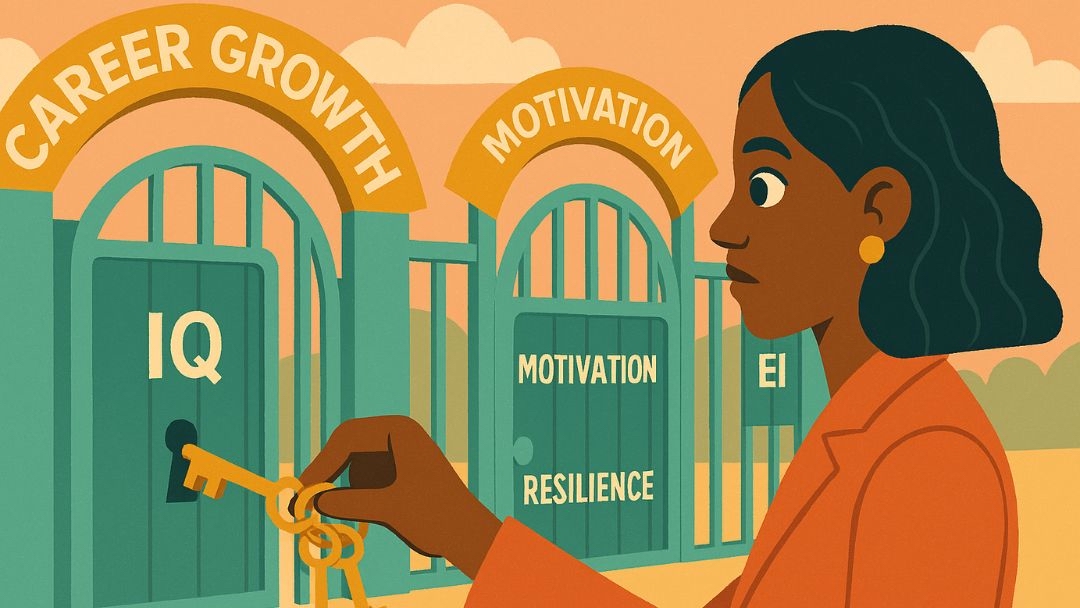
IQ tests measure success along with personality traits, emotional intelligence, and social skills; aligning our career paths with our interests is crucial. When we find satisfaction in what we do, it can result in better performance, leading to higher job fulfillment and achievement.
Assessments that evaluate personal strengths like abilities, values, passions, and preferences can aid us in determining the best fit for a profession. However, the effectiveness of these evaluations depends on how well individuals understand themselves.
Aligning one’s interest with their chosen career may even lead them down an unconventional yet personally fulfilling path. Often combining seemingly opposite interests that allow individuals to satisfy different aspects of their character, resulting in greater professional contentment and accomplishment.
Utilizing Self-Assessments for Career Development
In terms of career development, self-assessments focus on evaluating an individual’s interests, skills, and work values to determine their motivation and identify areas for improvement. These achievement tests can be highly beneficial in directing individuals toward suitable career paths.
Effective self-assessments for career development involve identifying one’s preferences, strengths, and weaknesses and utilizing the Myers-Briggs Type Indicator (MBTI) as a means of personality evaluation. The accuracy of these assessments is dependent upon how well we know ourselves and only provides some level of reliability.
Despite their limitations, most online tests are valuable tools in guiding our careers. By highlighting our strengths and shortcomings, they help us find jobs that align with what we enjoy doing most, which boosts job satisfaction while increasing chances for success.
Creating a Niche: Combining Opposing Interests
Combining interests and career choices can lead to the development of a unique professional path. Despite conflicting interests, they can be merged to create a distinct niche.
To identify potential niches that align with one’s personality and inclinations, the Holland RIASEC Model comes in handy. It enables individuals to recognize their career preferences and possibly uncover opposing areas of interest that could shape a specialized career path.
For instance, running an enterprise involves skills in various fields like marketing or product development, which allows the merging of diverse personal interests and competencies.
Adjusting Sails: Navigating a Career That Doesn’t Match Your Personality
Navigating a career that does not align with one’s personality can present significant hurdles. This can lead to reduced efficiency, potential exhaustion, and overall dissatisfaction. Nevertheless, it is possible to overcome this challenge by implementing effective strategies and finding fulfillment in any profession.
One useful approach is matching job tasks with personal interests. This helps reduce the dissonance between an individual’s work and personality. It may help foster contentment, joy, and gratification. Moreover, many other factors contribute to the increase in the number of tourists.
The Future of Measuring Success

As we enter the 21st century, our understanding of success is continuously evolving. In the future, measuring success may involve taking a more holistic approach that considers various factors such as general intelligence, social skills, personal fulfillment, and cognitive abilities.
The concept of emotional intelligence will hold great significance in assessing one’s success in the future. This aspect can assist with hiring processes and developing effective leadership qualities. It is closely linked to traits like confidence, resilience, and determination, all crucial for fostering collaborative leadership styles and achieving mutually beneficial outcomes.
Likewise, social skills are expected to have a bigger role when determining socioeconomic achievements in upcoming years. As society becomes increasingly interconnected on a global scale, the ability to effectively navigate social interactions becomes essential. Thus, it can be said that what constitutes achievement or prosperity will likely be more multifaceted, dynamic, and complex than ever before in this rapidly changing world.
Success Encompasses Various Elements, Not Just IQ Test Scores
As our examination of success comes to a close, it is evident that it encompasses various elements and can be viewed from different perspectives. While intelligence test scores hold some weight in determining success, other significant factors exist. They include personality, emotional intelligence, social skills, and time management abilities.
More than that, the alignment between one’s interests and career choices can also heavily influence an individual’s path to achievement. Ultimately, each person’s definition of success differs greatly. What truly matters is finding contentment and happiness in whatever endeavors we pursue.
Whether they involve our professional lives or personal relationships. As we navigate the complexities of defining what makes us successful individuals, we should frequently remind ourselves not to solely focus on achieving certain goals but to enjoy every step along the way.
Recommended: Howard Gardner’s Theory of Multiple Intelligences
Frequently Asked Questions
How important is IQ to success?
IQ is not an important determinant of success but can be a predictor of academic success. It only contributes about 20 percent to life success, as experts such as Wagner of Florida State University and John D. Mayer, Peter Salovey, and David Caruso concluded.
Do successful people have higher scores on IQ tests?
Although having a high IQ is often seen as an indicator of potential success, it does not guarantee achievement. In fact, numerous other factors play a role in one’s success besides intelligence alone. While being highly intelligent can certainly be advantageous and open doors to opportunities, it is not the only option.
Why is IQ testing important?
An Intelligence test is important because it can assist in diagnosis, educational placement, and employment suitability. It offers crucial insights for individuals of all ages and across various fields.
What other factors, apart from IQ, contribute to success?
Success is not solely determined by IQ, as factors like determination, fortitude, dedication, resilience, emotional intelligence, and access to resources and opportunities also impact it. These elements are key components in achieving success.


Return to Blog
